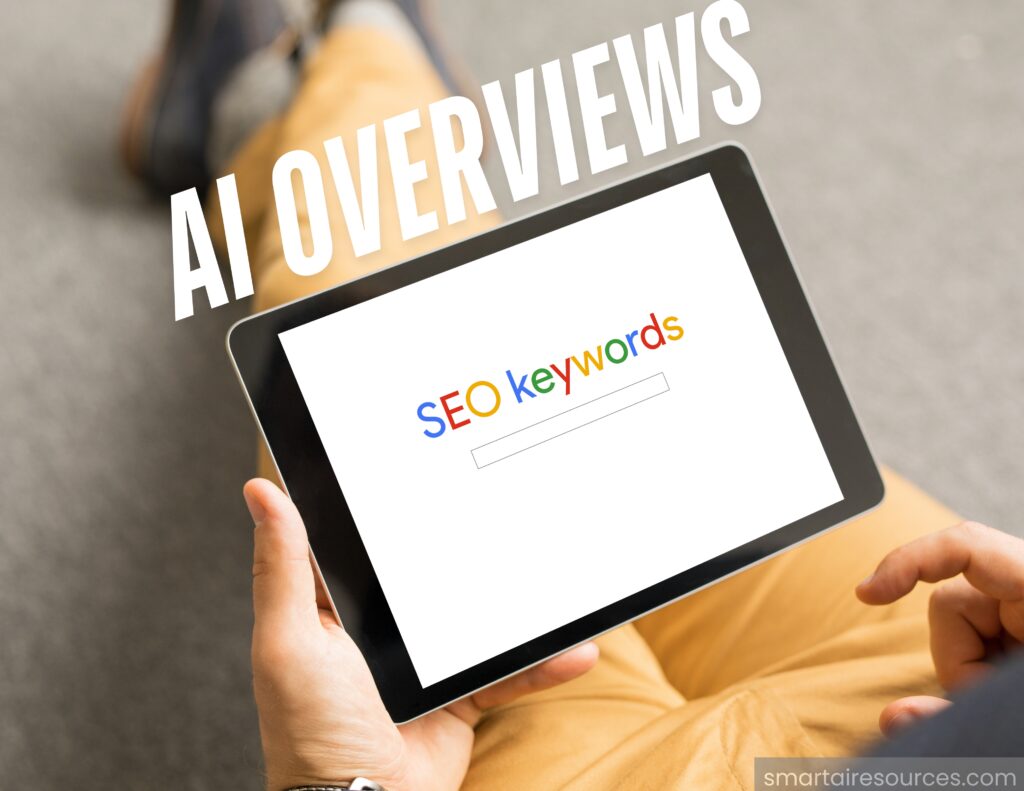
Google has once again changed the game with its latest update, AI Overviews. This feature, part of the Search Generative Experience (SGE), has begun rolling out in the US and will soon be available globally. But what exactly is AI Overviews, and how will it impact businesses, content creators, and SEO strategies? In this in-depth blog, we’ll explore how AI Overviews function, their effects on search results, and strategies to adapt to this new era of search.
What Is AI Overviews?
Google’s new method of presenting search results, known as AI Overviews, summarizes data from several highly regarded sources and shows it right on the search engine results page (SERP). Instead of the customary “10 blue links,” readers are now presented with a summarized response at the top of the page that has been prepared from reliable sources.
As an illustration, a search for “how to improve your VO2 max” used to yield a list of websites like Runner’s World and Healthline. However, with AI Overviews, Google now creates a summary at the top of the page that extracts important information from these websites and presents it in an understandable manner. The overview also includes links to the sources, but these links are much less prominent than they were previously.
This marks a fundamental shift in how Google processes and presents information. Instead of relying solely on user navigation to third-party sites, Google itself provides the primary response.
How AI Overviews Are Changing SEO
1. Declining Click-Through Rates (CTR)
The possible drop in click-through rates (CTR) is among the most pressing issues. If Google’s AI Overview provides the answer, users who are looking for quick information could no longer feel the need to click through to a website. This can be especially troublesome for companies and publishers that depend on organic traffic.
When a person searches for “how to improve domain authority,” for example, they will initially see four sponsored advertisements, followed by an overview produced by AI, featured snippets, and “People Also Ask” sections. They will only be able to get the conventional organic search results after navigating past all of these. It is much more difficult for organic results to get attention and clicks with this new layout.
2. The Impact on Content Creators
Imagine writing a well-researched 2,000-word article on SEO best practices, only to have Google extract key points and present them in an AI Overview, reducing the need for users to visit your site. This could impact:
- Blogs focusing on informational content
- Niche websites relying on organic traffic
- Businesses dependent on search-driven leads
3. The Role of Ads and Monetization
Ads continue to be Google’s main source of income. Ads are not removed by AI Overviews; rather, they move organic results lower down the screen. Users will initially see a number of advertisements when searching for competitive terms like “what is SEO,” followed by an AI Overview, featured snippets, and finally the organic listings. This change indicates that the need of paid advertising for visibility will only increase.
Strategies to Adapt to AI Overviews
1. Focus on Content That AI Overviews Can’t Replicate
AI Overviews work well for summarizing straightforward, factual information, but they struggle with:
- Interactive content (quizzes, surveys, calculators, tools)
- Unique research and proprietary data
- Multimedia content (videos, infographics, podcasts)
- Opinion pieces and expert analysis
By incorporating these elements into your content strategy, you can create assets that AI Overviews cannot fully replicate, increasing the likelihood that users will still visit your site.
2. Optimize for AI Overview Inclusion
Just as websites once optimized for featured snippets, it’s now time to optimize for AI Overviews. Here’s how:
- Structure content clearly with well-defined headings and bullet points.
- Use authoritative sources and link to reputable websites.
- Summarize key points concisely at the beginning or end of your content.
- Include FAQs within articles to align with AI-generated summaries.
By aligning your content with Google’s AI extraction process, you increase the chances of your site being included in AI Overviews.
3. Strengthen Your Brand Authority
Google prioritizes well-known and reputable sources. To establish yourself as an authority:
- Build high-quality backlinks from respected domains.
- Engage in social media and PR campaigns to increase brand recognition.
- Encourage mentions and citations from authoritative industry players.
4. Leverage Video and Audio Content
Since AI Overviews primarily focus on text, integrating multimedia can differentiate your content. Consider:
- Embedding YouTube videos related to your topic.
- Offering downloadable PDFs or reports with exclusive insights.
- Creating podcasts and audio versions of articles for deeper engagement.
5. Utilize Schema Markup and Structured Data
Enhancing your content with schema markup can help search engines better understand and categorize your information. Use:
- FAQ schema to improve chances of appearing in “People Also Ask” sections.
- Article schema to reinforce content authenticity.
- Video schema to highlight multimedia elements.
AI Overviews: A New Challenge or an Opportunity?
For brands that are prepared to adjust, the emergence of AI Overviews offers both new potential and problems. Businesses may continue to increase traffic and stay relevant in the ever-changing search market by concentrating on original, in-depth, and engaging content.
Consider AI Overviews as an additional layer of search optimization, similar to the popularity of featured snippets and “People Also Ask” sections in years past, rather than as a threat. Brands that adapt to change and adjust their SEO tactics appropriately will be the ones who thrive.
Final Thoughts
AI Overviews will change the way search engines operate and are here to stay. For those who are prepared to try and adjust, they offer fresh SEO chances even though they can result in reduced CTRs for some queries. Businesses may continue to prosper in this new search ecology by producing content that is high-quality, captivating, and multimedia-rich.
If you found this article helpful, share your thoughts in the comments below! What strategies are you using to adapt to AI Overviews? Let’s discuss!
